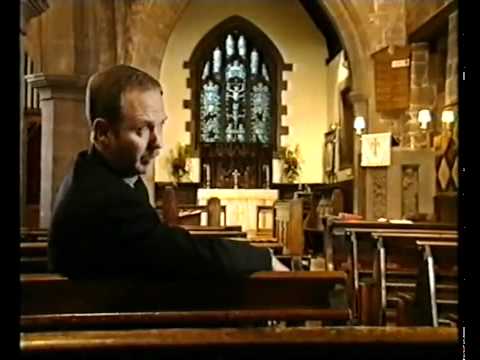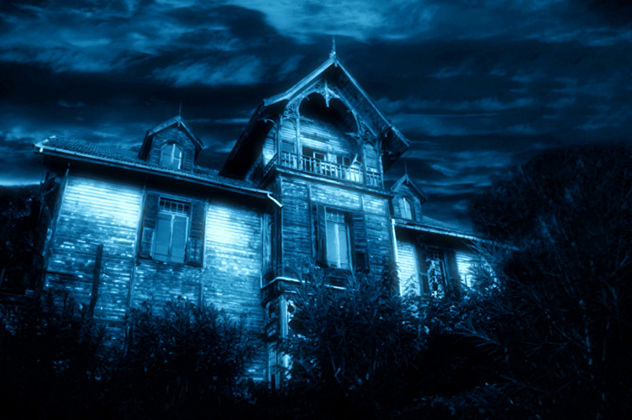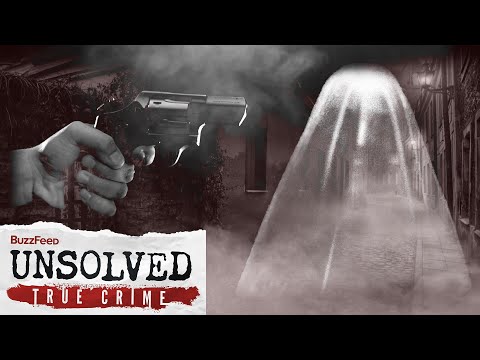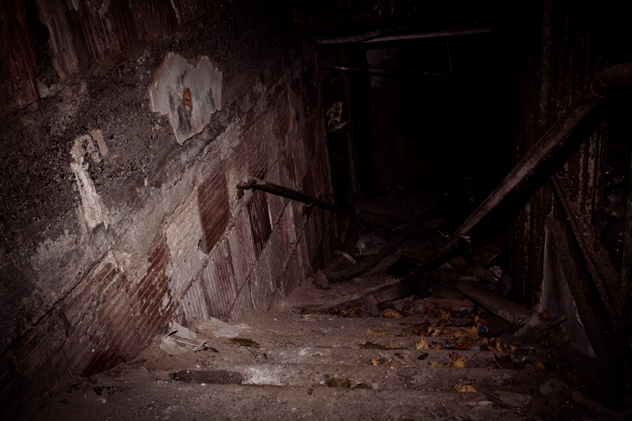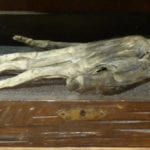10The Greenbrier GhostMurder Victim Helps Convict Her Husband
On January 23, 1897, 23-year-old Zona Heaster Shue died under mysterious circumstances at her home in Greenbrier County, West Virginia. Strangely, by the time a doctor arrived, Zona’s husband, Erasmus “Trout” Shue, had already moved her body from the downstairs area to the bed and dressed her. Throughout the next few days, Trout displayed some bizarre behavior over his wife’s passing, but since the cause of death was initially believed to be heart failure, no one suspected foul play. However, weeks after Zona was laid to rest, her mother, Mary Jane Heaster, paid a visit the local prosecutor to ask for her daughter’s body to be exhumed. This decision was motivated by alleged visits from Zona’s ghost. Mary Jane claimed that Zona’s ghost had visited her over the course of four nights and revealed that Trout was an abusive husband who had broken her neck by strangling her in a fit of rage. The authorities agreed to Mary Jane’s request to exhume her daughter. An autopsy revealed that Zona’s neck had been broken. Trout was arrested and charged with his wife’s murder, even though the evidence against him was very circumstantial. When Mary Jane was called to the witness stand at the trial, Trout’s defense attorney challenged the story about her supposed encounters with the “Greenbrier Ghost.” However, Mary Jane never wavered from her original story, and her testimony proved to be so convincing and believable that the jury could not disregard it. In the end, they would find Trout Shue guilty. He was given a life sentence at Moundsville Penitentiary, where he died three years later.
9The Ghost Of James L. ChaffinGhost Helps Family Find His Missing Will
In 1921, James L. Chaffin, a farmer from Mocksville, North Carolina, died after a fall. He left behind a wife and four sons. James’s will, which had been written out many years beforehand, left the family farm to his third son, Marshall. However, legal problems arose the following year, when Marshall unexpectedly died. Since there were no provisions for the rest of the Chaffin family in the will, they wound up losing their estate to Marshall’s widow. However, in 1925, James’s second son, James Pinkney Chaffin, shocked everyone by filing a lawsuit to challenge the will’s validity. Even more shocking was the fact that this lawsuit was brought on by alleged interactions with a ghost. James Jr. claimed he had been having a series of dreams where he was visited by his father’s spirit. One night, James Sr. suddenly appeared wearing his old overcoat and told his son that a new will could be found in the inside pocket. When James Jr. retrieved his father’s overcoat, he discovered that the inside pocket was covered by a new lining. Hidden in the pocket was a note that read: “Read the 27th chapter of Genesis in my daddy’s old Bible.” James Jr. soon tracked down his grandfather’s old Bible and was shocked to discover that a new will was actually hidden inside, right next to the 27th chapter of Genesis. It had been written by James Sr. in 1919. James Sr. now wanted his estate to be divided equally among his four children. At the trial, experts seemed to agree that the handwriting on the will actually did belong to James L. Chaffin. Even Marshall’s widow became convinced that the will was genuine, so she agreed to a settlement that returned control of the estate to the Chaffins.
8The Montrose GhostDead Pilot Returns To Clear His Name
On the morning of May 27, 1913, Lieutenant Desmond Arthur, an Irish-born pilot in the Royal Flying Corps, took off in a B.E.2 biplane for a seemingly routine training flight at the Montrose Airfield in Scotland. However, the right wing of the aircraft suddenly snapped off in mid-flight, and Arthur was killed in the subsequent crash. Initially, it was believed that the tragedy was caused by a faulty repair job on the plane. However, three years later, an official government investigation would determine that Arthur himself was at fault for the crash. Many of Arthur’s fellow airmen were unhappy about this black mark on his record, but it wasn’t long before Montrose Airfield would be plagued by a series of unexplained supernatural events. In August 1916, personnel stationed at Montrose started having visions of what appeared to be the ghostly apparition of a pilot. Some of the witnesses recognized the mysterious figure and believed it to be the ghost of Desmond Arthur. The sightings became so widespread that terrified airmen started abandoning their posts or requesting a transfer from Montrose. Finally, C.G. Gray, the editor of the flying magazine The Aeroplane, decided to push forward the theory that Arthur had returned to haunt his former airfield in response to the government investigation that smeared his name. Gray successfully lobbied for the investigation into the crash to be reopened. This time, the verdict was that Desmond Arthur was not responsible. After Arthur’s name was cleared, the Montrose Ghost would disappear, save for one last sighting where he appeared to be smiling.
7The Cock Lane GhostHaunting Fabricated To Accuse An Innocent
There have been numerous recorded cases of alleged hauntings that turned out to be complete hoaxes, but few of them created the sensationalism of the “Cock Lane Ghost.” In 1759, William Kent and his spouse, Fanny, moved into a house on Cock Lane, a narrow alley in the Smithfield section of London. Six months later, the couple would move out after a dispute over money: The landlord, Richard Parsons, refused to pay back a loan William had made to him. Shortly afterward, Fanny passed away from smallpox. In January 1762, William was shocked to read an article about himself in The Public Ledger. The article implied that William had murdered Fanny. The person responsible for this story was Richard Parsons, who claimed that the house on Cock Lane was now haunted by Fanny’s ghost. Fanny allegedly appeared before Parsons, telling him she did not die of smallpox and that her husband had poisoned her with arsenic. William was invited to his former home for a seance, in which a clergyman named John Moore would summon Fanny’s spirit. When asked a series of questions, the ghost responded with a series of knocks that painted William as a murderer. The Cock Lane Ghost became such a sensational story that large crowds would flock to the location. Seances became a frequent occurrence. Eventually, the whole story was largely considered a fraud when Parsons’s young daughter, Elizabeth, was caught rapping on a board to simulate the ghostly knocking sounds. In order to clear his name, William Kent filed a lawsuit charging Parsons, Reverend Moore, Parsons’s wife, and a servant with conspiracy. They were given short prison sentences and forced to pay restitution to William.
6Lowes CottageCouple Sues For Undisclosed Haunting
In 1994, an English couple named Andrew and Josie Smith moved into Lowes Cottage with their three children. The house was a centuries-old sandstone residence located in the village of Upper Mayfield. The Smiths had purchased it from a pair of sisters, Susan Melbourne and Sandra Podmore. However, according to the Smiths, they would soon discover that Lowes Cottage was haunted. Objects in the house started moving on their own and visions of ghostly figures appeared. At one point, Josie claimed that an unseen spirit attempted to rape and strangle her while she was in bed. The Smiths would also learn of a local urban legend involving a young milkmaid who once lived in the house before she was raped and murdered. The family decided to flee Lowes Cottage, but the previous owners filed suit against them for £3,000, the final installment of the Smiths’ down payment. In response, the Smiths filed a counter-suit against the former owners for failing to disclose that the home was haunted. The two sisters claimed they had never experienced any paranormal activity during their time there and believed the Smiths were fabricating the story to get out of paying what they owed. The case was heard at Derby County Court in 1999, and the Smiths made an attempt to make the far-fetched story sound convincing. A priest named Reverend Peter Mockford had been brought in to bless Lowes Cottage, and he would testify that he believed the house was haunted. In spite of this testimony, the judge did not believe the story and ruled in favor of the two sisters, ordering the Smiths to pay them the £3,000.
5Stambovsky v. AckleyA House Is Legally Declared Haunted
It’s very rare for lawsuits involving haunted houses to find success in a court of law, but the case of Stambovsky v. Ackley is an odd exception. In 1989, a man named Jeffrey Stambovsky purchased a house in Nyack, New York, which had previously been occupied by Helen Ackley and her family. However, it was not until after Stambovsky and his wife moved in that he learned that the house had attained much notoriety and was rumored to be haunted. For years, Ackley had been claiming that her house was occupied by ghosts, and she even sold her story to Reader’s Digest and other media outlets. The problem was that neither Ackley nor her realtor bothered to disclose this to Stambovsky before he purchased the home. Even though Stambovsky never saw any ghosts and did not believe in them, his wife was still terrified of the prospect of living in a haunted house. He decided to file a lawsuit against Ackley and her realtor for fraudulent misrepresentation and demanded to be let out of his contract. He initially lost his suit in lower court, but after a successful appeal, Stambovsky’s case would be heard in front of the appellate division of the New York Supreme Court in 1991. Believe it or not, the court actually ruled in Stambovsky’s favor. He was allowed out of his contract, and his down payment on the house was returned. The ruling was based on the fact that Ackley had publicly advertised her home as being haunted and made money from selling that story, so she was obligated to disclose this fact to potential buyers. In the words of one of the judges: “As a matter of law, the house is haunted.”
4The Gray ManGhost Saves People From Hurricanes
Pawleys Island is a small coastal town in South Carolina. The town has become notable for the presence of a spirit known as “The Gray Man.” Ever since 1822, there have been numerous sightings of a mysterious spectral figure who wanders the area’s coastline. Much folklore surrounds the Gray Man, and there are numerous theories about his identity. One popular story is that he was a young man on the way to ask his lover to marry him but died after getting caught in quicksand. Because of this, he is forever condemned to wander the area, searching for his lost love. However, what elevates the Gray Man from being more than a standard ghost story is the longstanding belief that seeing him could potentially save your life. It’s rumored that the Gray Man always makes an appearance before a major hurricane hits the area. If you happen to encounter him, you will be spared from the storm’s destruction. Eyewitnesses have claimed that the Gray Man allegedly warned them to leave the area before a hurricane arrived. When the hurricane passed, these witnesses would return to the area to find their homes completely undamaged. While these stories may sound like urban legends, there is at least one documented case of such a situation happening in modern times. In September 1989, an elderly couple named Jim and Clara Moore claimed to have passed by the Gray Man during a walk outside their beach home. Not long afterward, Hurricane Hugo hit the area and caused widespread destruction. However, even though the surrounding homes were completely destroyed, the Moores’ residence was inexplicably left unharmed.
3The Hammersmith GhostMan Shoots A Man He Thinks Is A Ghost
On January 3, 1804, Francis Smith, an excise officer from the Hammersmith area of London, was arrested for the shooting death of a bricklayer named Thomas Millwood. However, Smith claimed self-defense and had one hell of an excuse: Millwood was dressed in white clothing, so Smith thought he was shooting a ghost! Believe it or not, at the time, this did not seem like a far-fetched story. Throughout the previous month, Hammersmith had been plagued by numerous sightings of what appeared to be a ghostly apparition. Things got really serious when a pregnant woman claimed to have been attacked by the ghost and died two days later. Watch this video on YouTube Armed vigilantes started searching for the ghost, which is what Francis Smith just happened to be doing on the night of January 3, when he shot Thomas Millwood. Because the community was so terrified of the “Hammersmith Ghost,” people wondered whether Smith should be held liable for Millwood’s death, but he was still charged with willful murder. At the trial, witnesses actually testified about previous incidents where Millwood’s white clothing had frightened people who mistook him for a ghost. The jury initially decided that Smith should only be convicted on the lesser charge of manslaughter. However, the judge overruled their verdict and told them they needed to either find Smith guilty of murder or acquit him altogether. They chose to find him guilty of murder, and he was sentenced to death. However, Smith was soon granted a royal pardon, which commuted his sentence to one year’s hard labor. After this incident, the Hammersmith Ghost was never seen again.
2The Ghost Of Russell ColvinInnocent Brothers Get Charged With Murder
In May 1812, a man named Russell Colvin mysteriously disappeared without explanation from his hometown of Manchester, Vermont. Colvin happened to be the brother-in-law of Jesse and Stephen Boorn, who never liked him. Colvin’s whereabouts would remain unknown for the next seven years until the Boorn brothers’ uncle, Amos Boorn, shared a crazy story. Apparently, Amos had been having recurring dreams where the ghost of Russell Colvin appeared at his bedside. The ghost said that he had been murdered and directed Amos toward a cellar hole on the Boorn family farm, where his remains were supposedly hidden. A search of the cellar hole turned up no remains but did uncover some items that allegedly belonged to Colvin. Shortly afterward, a dog dug up some bone fragments at another location near the Boorns’ property. The Boorn brothers were subsequently arrested and charged with Colvin’s murder. After a forceful interrogation, both of them eventually confessed to the crime. Even when it became apparent that Colvin’s so-called remains actually belonged to an animal and that the Boorns’ confessions had been coerced, there was enough circumstantial evidence for them to be convicted. Jesse would receive life in prison while Stephen was sentenced to death via hanging. However, in November 1819, when the New York Evening Post published an article about the Boorns’ convictions, a witness came forward to claim he had seen Russell Colvin in New Jersey. Colvin was eventually tracked down and brought back to Manchester to prove he was alive. On December 22, 1819, just one month before Stephen’s scheduled execution, Colvin shocked the community by making a surprise appearance. The Boorn brothers were officially exonerated.
1Booty v. BarnabyMan Sued For Slandering A Ghost
If one was to look through centuries’ worth of court records, they would be hard pressed to find a more bizarre case than Booty v. Barnaby. Some specific details are unknown (such as the first names of the participants), and the whole thing sounds too unbelievable to be true. Yet, an official excerpt of this case was actually found in the records of the Court of the King’s Bench from 1688. The story goes that on May 15, 1687, a sea captain named Barnaby and his crew were shooting for rabbits on the island of Stromboli in Italy. That afternoon, they saw a man being chased across the island by a figure dressed in black. Barnaby recognized the man being pursued as Mr. Booty, his neighbor from back home in Gravesend, England. The two figures ran toward a volcano and mysteriously disappeared into some flames of fire. Months later, Barnaby returned home and was shocked to learn that Mr. Booty had died around the exact same time Barnaby saw him being chased on Stromboli. Barnaby became convinced that he had seen Booty’s ghost and that he was chased into the flames of Hell. His story soon spread around town, but Barnaby received a stunning surprise when he found out that the deceased man’s widow, Mrs. Booty, was filing a lawsuit against him for slander. Apparently, she did not like the idea of Barnaby spreading rumors that her late husband had been condemned to Hell. Believe it or not, this case was actually heard at the Court of the King’s Bench. Barnaby had recorded the incident from Stromboli in his ship’s journal, and at least 30 witnesses backed up his story. Many of them testified that Mr. Booty appeared to be dressed in the same clothing he was wearing at the time of his death. The court came to the conclusion that a whole 30 witnesses could not be mistaken. They ruled that Barnaby had not committed slander. Mrs. Booty lost the case. Robin Warder is a budding Canadian screenwriter who has used his encyclopedic movie knowledge to publish numerous articles at Cracked.com. He is also the co-owner of a pop culture website called The Back Row and recently worked on a sci-fi short film called Jet Ranger of Another Tomorrow. Feel free to contact him here.




